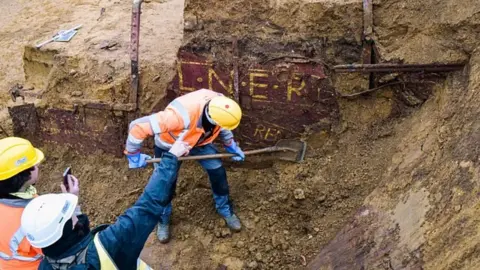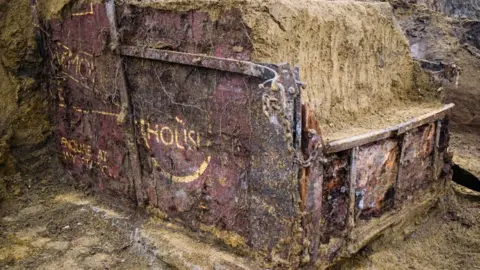Century-old LNER train wagon found in Belgium is rare first model
 LNER
LNERPart of an LNER train dating back to the 1930s which was discovered by archaeologists in Belgium last month is exceptionally rare, experts have said.
The red storage wagon, used for transporting belongings when people moved house, was unearthed in Antwerp.
After the discovery of the wooden truck, archaeologists said it was a "mystery" how it had ended up there.
York-based LNER has now confirmed the wagon was one of the firm's rare first models dating back nearly 100 years.
The vehicle was found in March by a team from the Urban Archaeology department of the City of Antwerp.
It was buried near the wall of a 19th Century fortress known as the Northern Citadel.
The archaeologists had been excavating the area as part of work with organisations building a new ring road around the city.
 LNER
LNERLNER said that since the initial discovery, internal research into the truck suggested it was the first model of wagon which was briefly in service with the firm in about 1930.
It was particularly rare because, at the time, the company used blue wagons - while the new discovery was red.
Antwerp archaeologist Femke Martens said closer examination of the wagon showed the only features identifying it were several inscriptions, including the letters "LNER".
Mr Martens said other inscriptions included one stating "furniture removal to house", another which read "enquire at any station", and a third, "BK769", which identified its size and what it was used for.
He confirmed that the wagon was "thought to be around 100 years old".
"It's a mystery as to how the carriage came to be in Antwerp, and unfortunately there's very little left of the relic as it disintegrated while being excavated.
'Shed more light'
Stuart Thomas, LNER communications director, said: "This curious find has certainly generated lots of interest."
"We are delighted the team from the Urban Archaeology department of the City of Antwerp have helped shed more light on the discovery," he added.
"We're fascinated by LNER's history, and we'd like to thank the team for their help in unearthing more information about LNER's proud past."
Train services run by LNER, or London and North Eastern Railway, started operating in January 1923 on what later became known as the East Coast Mainline.
The LNER name returned in June 2018 after previous operator Virgin Trains East Coast returned the franchise to the government.

Follow BBC Yorkshire on Facebook, X (formerly Twitter) and Instagram. Send your story ideas to [email protected].
